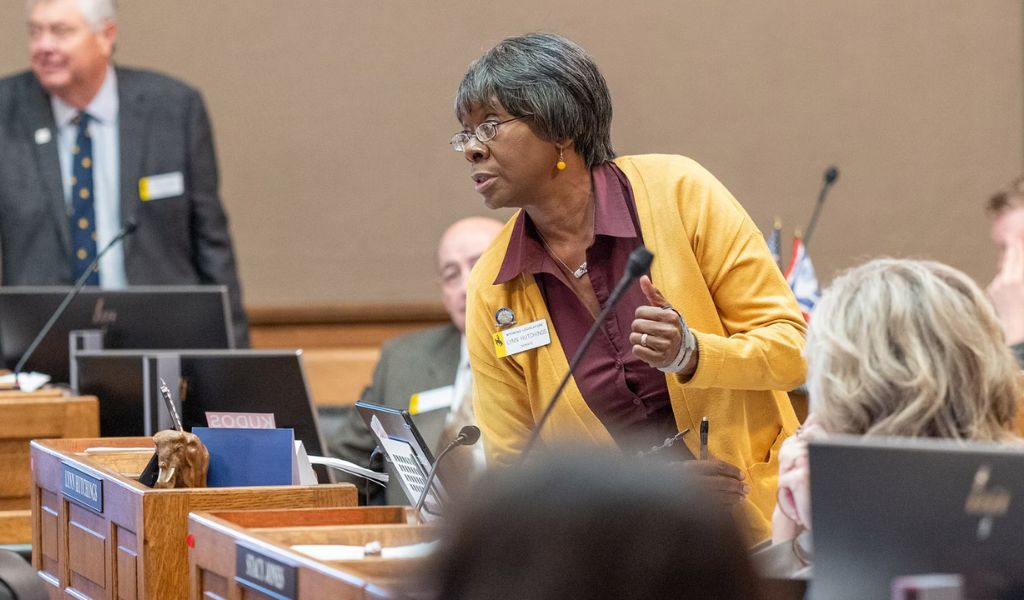Sen. Lynn Hutchings, a Republican from Cheyenne, feels that the social pressure on gender pronouns is out of control and wants to take action in Wyoming.
She explained that this is the reason she supported Senate File 94, the Act Concerning Compelled Speech and State Employers, which would forbid the state and any of its political branches from forcing the use of words such as gender pronouns in contracts, licences, employment, or grant applications. It also covers Wyoming’s public schools and county administrations.
Hutchings stated that “the state should not compel someone to do this,” which is why her law preserves free expression.
SF 94 was sent to the House for consideration after the Senate approved it on third reading on Tuesday by a vote of 21 to 10.
Motivation
According to Hutchings, she is not aware of any particular cases in which the state has made employees use a preferred pronoun, like “he/him,” “she/her,” or the gender-neutral singular “they/them,” against their choice. Additionally, “neopronouns” like “xe/xem” are used to convey nonbinary gender identification.
Hutchings asserted, “You can’t make someone call someone by their preferred pronouns.” “There is a violation of the right to free speech.”
There is a growing national and Wyoming debate about the boundaries of free speech, as several social media corporations have taken contentious steps to limit material they deem offensive or false.
According to Hutchings, she was driven to draft the bill by a constituent who deals with the county and state administrations. Additionally included by the measure are those who have service contracts with the state or a county.
How It Operates
Since school districts and community colleges are regarded as political subdivisions in Wyoming, the law would also apply to workers of state and county governments.
The obligation for teachers to utilise preferred pronouns when speaking with children is not addressed in the bill. According to Education Week, laws established in at least ten states prohibit instructors, staff, and classmates from using a student’s pronouns or name if it doesn’t correspond with the sex assigned at birth.
In Wyoming, SF 94 would not apply to private companies.
SF 94 would not only forbid the practice but also give citizens a civil remedy to sue the state in civil court for breaking the rule. Injunctive or declaratory relief, compensatory damages, and any appropriate legal fees and court expenses may also fall under this category.
National Concern
There has been a strong conservative response to the growing usage of alternative gender pronouns, which some opponents have claimed is a sign of broader dislike of transgender persons.
Hutchings stated, “This has nothing to do with transgender rights; it’s about compelling speech.”
The usage of pronouns in the workplace is still unregulated by the federal government.
According to guideline materials from the U.S. Equal Employment Opportunity Commission, it is illegal and against the Civil Rights Act of 1964 to “intentionally and repeatedly use the wrong name and pronouns to refer to a transgender employee.”
The U.S. Supreme Court decided in 2022 that while the act protects LGBTQ employees against discrimination, it did not address whether misgendering someone or refusing to use their preferred name at work is illegal under federal civil rights law.
Returned to Wyoming…
When Hutchings asked the state of Wyoming about its pronoun policy, she said she didn’t receive a clear answer and was instead directed to a couple Title IX provisions, which she doesn’t think have anything to do with pronoun usage.
She declared, “This bill does not seek to discriminate.” “It’s just something we want the government to keep private.”
Sen. Chris Rothfuss, a Democrat from Laramie, brought up this issue last Friday during the bill’s first reading. He questioned if SF 94 would shield individuals from state and federal laws that forbid workplace harassment.
He also questioned whether calling someone who identifies with their biological sex as such would be mandated by the bill.
He remarked, “This reads as a way around that.” “Is there a double standard here where we will use what we consider to be the traditional pronouns, whether someone likes it or not, or can anyone use this at any time to choose whatever pronouns they want to call someone by?”
Hutchings stated that she thinks it should be the employees’ responsibility to find a solution on their own in cases such as this.
Follow and bookmark our site for more news related content.

